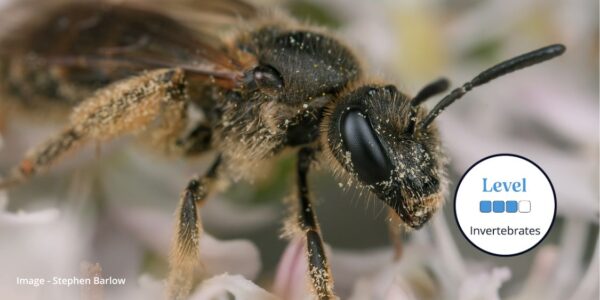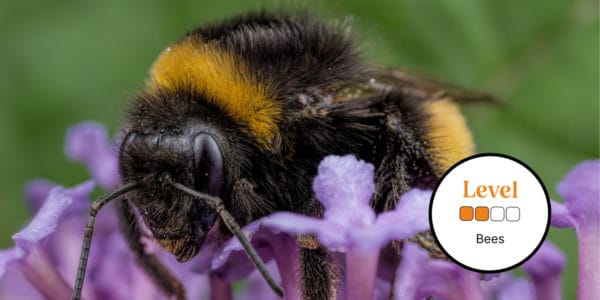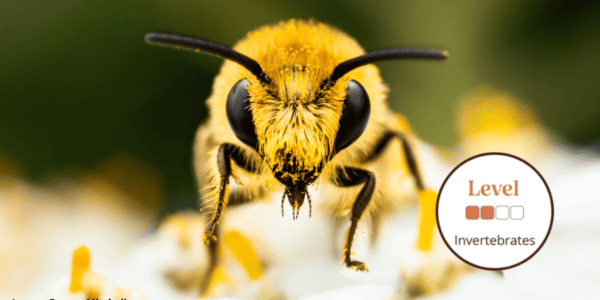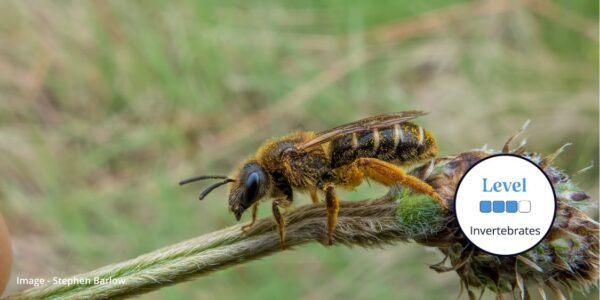Join like-minded people with an interest in field recording for a day of identifying and surveying in an informal environment. Naturalists of all levels (from beginner to expert) will be able to share their knowledge with peers and help each other improve knowledge and build confidence in biological recording.
Join us at Hartlebury Common for a day of sampling the resident invertebrates, with a particular focus on bees and wasps. We will use a variety of techniques to collect and identify as many different species as possible, with guidance from our expert tutor. Throughout the day we will build a species list and all records will be submitted through iRecord.
Please be aware that this day will involve killing and preserving of specimens.
What will the day involve?
- Practical experience using different sampling methods to survey invertebrates
- Practical experience in species identification in the field
- Practical experience in collecting and preserving specimens
- A chance to meet fellow minded people from a range of different disciplines
- Access to field equipment with support and guidance from an expert tutor and a member of the FSC BioLinks project team
It’s free to join in, however, you must be at least 18 years of age and study space is limited so booking is essential.
We will not have access to facilities so please bring your own lunch and any other refreshments you may require!
Please note that this event will involve individuals collecting, preserving and killing invertebrate specimens for identification purposes in order to assist us in generating a site species list.
Tutor: Ian Cheeseborough
Ian Cheeseborough is self-employed in the field of habitat management and entomological surveys, mainly in Shropshire. He has been studying Aculeate Hymenoptera – bees, wasps and ants for the past ninteen years and is County Recorder for this group of insects. He also runs a number of courses on Aculeates at Preston Montford FSC.Tutor: Rachel Davies
Rachel first became interested in invertebrates whilst working on a dragonfly reintroduction project in Cheshire. This included carrying out larval sampling, exuviae searches and adult transects. She later went on to work with mosquitoes for scientific research at the Liverpool School of Tropical Medicine. Rachel previously worked for the FSC BioLinks project as the West Midlands Project Officer.
In her spare time, she is an active biological recorder with a fondness for moths.
Covid Measures
In order to keep our customers and staff safe we ask that anyone attending our centres:
- wears a face covering when in shared indoor space (unless exempt).
- maintains social distancing.
- cleans their hands regularly.
- takes a Covid-19 test before they arrive.
Example Timetable
- Please arrive in time for the course to start promptly at 10:00 am.
- The Field Recorder Day will end at 4:00 pm.
What's Included
- Practical experience using different sampling methods to survey invertebrates
- Practical experience in species identification in the field
- Practical experience in collecting and preserving specimens
- A chance to meet fellow minded people from a range of different disciplines
- Access to field equipment with support and guidance from an expert tutor and a member of the FSC BioLinks project team
Bursaries and Subsidies
FSC BioLinks
FSC BioLinks is an exciting project for FSC in the South East and West Midlands, bringing together existing volunteers with skills in biological recording and identification, and new volunteers.
This project provides subsidised training courses, learning opportunities and digital tools focussed on invertebrate identification for anyone involved or interested in biological recording, to build and strengthen the community.
Invertebrates provide us with many useful ecosystem services, like pollination and decomposition, which we cannot survive without but their numbers are declining. Few people know how to identify or record invertebrates meaning there is a lack of data.
We are delighted to have been awarded a grant of £1.23 million from the National Lottery Heritage Fund for this project.
Before You Attend
Getting to Hartlebury Common
Instructions will be sent via email to those booked, a few days prior to the event.
What to bring
- Notebook and pencil
- Lunch
- Suitable clothing for the weather (warm clothing, waterproofs) and suitable footwear (walking boots or wellies)
- Any personal field equipment you have, such as a hand lens and pooter (equipment will be provided for those that need it).
Please note that this event will involve individuals collecting, preserving and killing invertebrate specimens for identification purposes in order to assist us in generating a site species list.
There will be a member of staff with first aid training and access to a first aid kit on site. If you have special medical requirements please let us know as soon as possible so we can plan the course.
Sorry this course has ended




